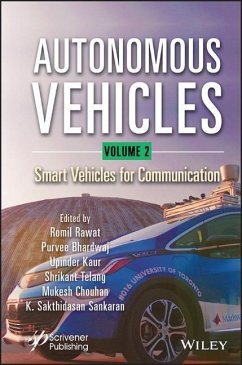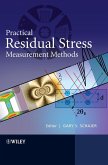AUTONOMOUS VEHICLES
The companion to Autonomous Vehicles Volume 1: Using Machine Intelligence, this second volume in the two-volume set covers intelligent techniques utilized for designing, controlling, and managing vehicular systems based on advanced algorithms of computing like machine learning, artificial intelligence, data analytics, and Internet of Things (IoT) with prediction approaches to avoid accidental damages, security threats, and theft.
Besides communicating with other vehicles, self-driving cars connected to a 5G network will also be able to communicate with different infrastructure elements that make up our roads and other transportation and communication systems. Similarly, an unmanned aerial vehicle (UAV), an aircraft without any human pilot, crew, or passengers on board, can operate under remote control by a human operator, as a remotely-piloted aircraft (RPA), or with various degrees of autonomy. These include autopilot assistance and fully autonomous aircraft that have no provision for human intervention. Transportation is a necessary, but often painful process. With fully autonomous driving, passengers will be freed to accomplish their own goals, turning the dead hours of driving into fruitful hours of learning, working, engaging, and relaxing. Similarly, UAVs can perform functions that human-operated aircraft cannot, whether because of the environment or high-risk situations.
The purpose of the book is to present the needs, designs, and applications of autonomous vehicles. The topics covered range from mechanical engineering to computer science engineering, both areas playing vital roles in programming, managing, generating alerts, and GPS position, artificial intelligence-based prediction of path and events, as well as other high-tech tools, are covered in this book, as well. Whether for the student, veteran engineer, or another industry professional, this book, and its companion volume, are must-haves for any library.
Hinweis: Dieser Artikel kann nur an eine deutsche Lieferadresse ausgeliefert werden.
The companion to Autonomous Vehicles Volume 1: Using Machine Intelligence, this second volume in the two-volume set covers intelligent techniques utilized for designing, controlling, and managing vehicular systems based on advanced algorithms of computing like machine learning, artificial intelligence, data analytics, and Internet of Things (IoT) with prediction approaches to avoid accidental damages, security threats, and theft.
Besides communicating with other vehicles, self-driving cars connected to a 5G network will also be able to communicate with different infrastructure elements that make up our roads and other transportation and communication systems. Similarly, an unmanned aerial vehicle (UAV), an aircraft without any human pilot, crew, or passengers on board, can operate under remote control by a human operator, as a remotely-piloted aircraft (RPA), or with various degrees of autonomy. These include autopilot assistance and fully autonomous aircraft that have no provision for human intervention. Transportation is a necessary, but often painful process. With fully autonomous driving, passengers will be freed to accomplish their own goals, turning the dead hours of driving into fruitful hours of learning, working, engaging, and relaxing. Similarly, UAVs can perform functions that human-operated aircraft cannot, whether because of the environment or high-risk situations.
The purpose of the book is to present the needs, designs, and applications of autonomous vehicles. The topics covered range from mechanical engineering to computer science engineering, both areas playing vital roles in programming, managing, generating alerts, and GPS position, artificial intelligence-based prediction of path and events, as well as other high-tech tools, are covered in this book, as well. Whether for the student, veteran engineer, or another industry professional, this book, and its companion volume, are must-haves for any library.
Hinweis: Dieser Artikel kann nur an eine deutsche Lieferadresse ausgeliefert werden.








